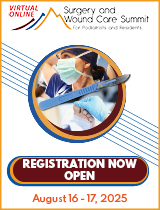|
|
|

|
Search
06/02/2025 Allen M. Jacobs, DPM
Do We Really Have a Medical Degree (Gary S. Smith, DPM)
I am in agreement Dr. Smith, that a 3-year
residency does not guarantee competency for the
treatment of even uncomplicated pathology. There
are variations in the podiatric residency
experience just as there are such variations in
medical residencies. Dr. Smith is also correct
that not all podiatrists wish to practice nor
desire to do so to the full scope of their DPM
degree as allowed in their state. As for
individual DOPs, this is also at times potentially
problematic, but much less so now. At the
hospitals where I practice, orthopedic surgeon or
not, without a spine fellowship or some
extraordinary circumstance you will not be given
spine DOPs. Orthopedic surgeons making their
living doing discretionary total joints do not do
pelvic fractures. As for variability in training,
an orthopedic surgeon can train at the HSS in New
York or our local St. Louis osteopathic hospital.
The experiences are likely far from equal.
The 3-year residency is the standard in our
profession. I would rather see over-educated than
under-educated. Last night I was in the OR with a
life-threatening necrotizing fasciitis patient.
The patient had complex medical history with
multiple co-morbities. He was on Eliquis. He was
sick, septic. I quizzed the third-year resident at
the scrub sink in the lab criteria for NF and he
knew them. The decision on whether on not to use a
$26,000 drug to reverse the Eliquis was left to ME
by medicine. The decision on the type of
anesthesia needed was left to ME. The consulting
physicians spoke with me and my opinions regarding
this ill patient were honored and respected. I
believe a 3-year residency is needed if we are now
treating such patients.
There are procedures I do not do and refer to
younger DPMs. There are patients I do not treat
and refer to younger DPMs. Of course there is a
difference between can we do it and should we do
it. Experience is required to know when to do a
punch biopsy, a P & A, a fungal toenail culture,
or a trans metatarsal amputation, Lapidus,
prescribe an AFO, inject a heel, order vascular
studies, or refer a patient.
Albert Einstein famously postulated “ there is no
true knowledge other than experience “. The
current state of podiatry is the 3 year experience
+|- a fellowship. The profession determined this
would best serve the public and the profession. We
have grown in acceptance as a result. More
experience is greater knowledge no matter what the
specific nature of a podiatrists practice may be.
We cannot return to a variety of podiatry
residency classifications which is confusing to
medicine. An ENT residency is an ENT residency. A
general surgery residency is a general surgery
residency. And a podiatry residency should be a
podiatry residency. I want the best training for
our graduates. We owe that to the public. We owe
that to our graduating students. We owe that to a
podiatry profession which has evolved so far and
is integrated into orthopedic groups, hospital
groups, the armed services, the VA, medical
groups, everywhere.
This was absolutely not the situation when I
graduated 50 years ago. Back then podiatrists
worked together learning as “ we went along “.
That is no longer the case. There is no support
for the hypothesis that a 3-year residency
requirement is a negative recruitment factor to
the colleges. Ad hominem attacks do not address
this critical issue. The 3-year residency
requirement has served this profession well, and
will continue to do so. It is not a recruitment
impediment. There is no basis to suggest otherwise
beyond unfounded opinions. Straw man arguments
that “not everyone wants to do surgery “ do not
alter the need for experience in the evaluation
and treatment of dermatologic disorders, or sports
medicine, or wound care, or primary podiatry care.
Allen Jacobs, DPM, St. Louis, MO
There are no more messages in this thread.
|
| |

|
|







